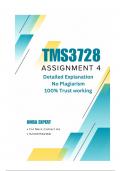,TMS3728 Assignment 4
1.1 Explain why anyone should learn science and why science should be taught to
learners (4 Marks)
Importance of Learning Science
1. Develops Critical Thinking and Problem-Solving Skills:
○ Science education fosters analytical thinking and the ability to solve problems.
Learners are encouraged to question hypotheses, analyze data, and derive
logical conclusions, which are essential skills in everyday life and various
professions.
2. Promotes Informed Decision-Making:
○ Understanding scientific principles helps individuals make informed decisions
about health, environment, technology, and other aspects of life. For instance,
knowledge about nutrition, climate change, and technological advancements can
lead to healthier and more sustainable choices.
3. Encourages Curiosity and Lifelong Learning:
○ Science stimulates curiosity about the natural world and encourages a lifelong
passion for discovery and learning. This intrinsic motivation can lead to
continuous personal and professional development.
4. Supports Technological and Societal Progress:
○ Advances in science drive technological innovation and societal progress.
Learning science equips individuals with the knowledge to contribute to
advancements in medicine, engineering, environmental conservation, and more.
Importance of Teaching Science to Learners
1. Foundation for Future Learning:
○ Science education in early childhood and throughout schooling provides a strong
foundation for future learning in various disciplines. It integrates concepts from
mathematics, engineering, and technology, creating a multidisciplinary
understanding.
2. Cultivates Scientific Literacy:
○ Teaching science helps develop scientific literacy, which is the knowledge and
understanding of scientific concepts and processes required for personal
decision-making, participation in civic and cultural affairs, and economic
productivity.
3. Encourages Engagement and Participation:
, ○Science education promotes engagement and active participation in learning.
Hands-on experiments, projects, and real-world applications make learning more
interactive and enjoyable, enhancing retention and understanding.
4. Prepares for a Competitive Workforce:
○ In a rapidly evolving job market, skills in science, technology, engineering, and
mathematics (STEM) are highly valued. Teaching science prepares learners for
careers in these fields, ensuring they are competitive in a global economy.
5. Addresses Global Challenges:
○ Many of the world's pressing issues, such as climate change, health crises, and
resource management, require scientific solutions. Educating learners in science
equips them with the knowledge and skills to tackle these global challenges.
6. Promotes Equity and Inclusion:
○ Science education should be accessible to all learners, regardless of
background, to ensure diverse perspectives and ideas contribute to scientific
progress. Teaching science inclusively helps bridge gaps and promotes equity in
education and professional fields.
Conclusion
Learning and teaching science is essential for individual development, societal advancement,
and addressing global challenges. By fostering critical thinking, curiosity, and scientific literacy,
science education prepares learners to navigate and contribute to an increasingly complex
world.
References
1. National Research Council. (2012). A Framework for K-12 Science Education: Practices,
Crosscutting Concepts, and Core Ideas. Washington, DC: The National Academies
Press.
2. Bybee, R. W. (2013). The Case for STEM Education: Challenges and Opportunities.
Arlington, VA: NSTA Press.
3. American Association for the Advancement of Science. (1990). Science for All
Americans. New York, NY: Oxford University Press.
4. UNESCO. (2015). UNESCO Science Report: Towards 2030. Paris: UNESCO Publishing.
5. National Science Teachers Association. (2011). Quality Science Education and
21st-Century Skills. Arlington, VA: NSTA Press.
1.2 Describe any five (5) aspects that should be addressed when a science teacher is
developed
Developing a science teacher involves addressing several key aspects to ensure they are
well-prepared to effectively teach and inspire their students. Here are five important aspects:
1. Content Knowledge





